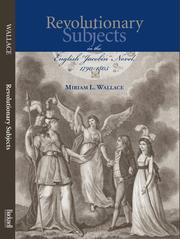
Revolutionary subjects in the English "Jacobin" novel
By Miriam L. Wallace
Subjects: Jacobins in literature, Politics and literature, English fiction, English fiction, history and criticism, 18th century, French influences, Revolutionaries in literature, English fiction, history and criticism, 19th century, Political fiction, English, History and criticism, Political fiction, history and criticism, History, Human rights in literature, English Political fiction
Description: *Revolutionary Subjects in the English "Jacobin" Novel* engages ongoing debates on subject formation and rights discourse through the so-called "English Jacobin" novels. Ostensibly celebrating the universal rights-bearing subject, these political novels inadvertently also questioned the limitations of such universal conceptions. Including works by both men and women, and those normatively identified as radical alongside others considered more conservative or even "anti-Jacobin," this work examines the shared efforts to represent developing political consciousness and to inculcate such consciousness in readers across a reformist continuum. These novels' efforts to expand the citizen-subject threatened to reveal the cost implicit in accessing subjectivity on universal terms. Wallace argues that subversive narrative strategies in fiction, including William Godwin's *Things as They Are* (1794), Robert Bage's *Hermsprong* (1796), and Amelie Opie's *Adeline Mowbray* (1805), undercut and question the sovereign subject modeled as the ideal republican radical subject and describe a discourse that is not always in line with the work's overt "moral." If the concept of human rights appears both necessary and inadequate in 2009, it was likewise problematic in the revolutionary 1790s. [find at Bucknell University Press][1] **Reviews** "Wallace's book is an important contribution to [the] work of cultural recovery, including insightful and probing analyses both of understudied literary texts and more familiar ones, as well as a sophisticated theoretical framework in which to view them together...Wallace's book is an indispensible contribution to the study of the revolutionary era and will be welcomed by scholars of the period for its cogent analyses as well as for its carefully wrought depiction of a culture whose concerns, vibrantly and forcefully articulated in their own time, continue to be so strikingly relevant today." -- Amy Garnai, in Eighteenth-Century Fiction 2010: 440. "Sharp and cogent..." -- Ian Duncan, in SEL 2010: 908 [1]: http://www.bucknell.edu/script/upress/book.asp?id=376
Comments
You must log in to leave comments.